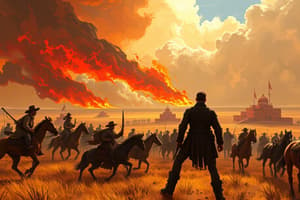Podcast
Questions and Answers
What was the main outcome of the Dred Scott v. Sandford case?
What was the main outcome of the Dred Scott v. Sandford case?
- African Americans were granted citizenship.
- Congress was given more power over territories.
- Slavery was deemed unconstitutional in all territories.
- African Americans were ruled not to be U.S. citizens. (correct)
What did the Lecompton Constitution represent?
What did the Lecompton Constitution represent?
- A proposal for a free state in Kansas.
- A plan to abolish slavery in the territories.
- A compromise to avoid civil war.
- A pro-slavery constitution for Kansas. (correct)
What was the significance of the Lincoln-Douglas debates?
What was the significance of the Lincoln-Douglas debates?
- They established Lincoln as a strong pro-slavery advocate.
- They highlighted the political stance of Stephen Douglas on tariffs.
- They focused solely on economic issues.
- They brought national attention to the issue of slavery. (correct)
What principle did Stephen Douglas articulate during the Lincoln-Douglas debates?
What principle did Stephen Douglas articulate during the Lincoln-Douglas debates?
What did Chief Justice Roger Taney declare regarding the Missouri Compromise?
What did Chief Justice Roger Taney declare regarding the Missouri Compromise?
What principle did the Kansas-Nebraska Act introduce regarding slavery in the newly formed territories?
What principle did the Kansas-Nebraska Act introduce regarding slavery in the newly formed territories?
Which individual is best known for advocating popular sovereignty and was a proponent of the Kansas-Nebraska Act?
Which individual is best known for advocating popular sovereignty and was a proponent of the Kansas-Nebraska Act?
What event does the term 'Bleeding Kansas' refer to?
What event does the term 'Bleeding Kansas' refer to?
What was the significance of the Pottawatomie Creek incident?
What was the significance of the Pottawatomie Creek incident?
What did the Sumner-Brooks incident highlight about American society at the time?
What did the Sumner-Brooks incident highlight about American society at the time?
Which political party emerged in response to the Kansas-Nebraska Act?
Which political party emerged in response to the Kansas-Nebraska Act?
Which president’s administration faced criticisms for its inaction during escalating tensions over slavery?
Which president’s administration faced criticisms for its inaction during escalating tensions over slavery?
What was the primary focus of the Know Nothing Party?
What was the primary focus of the Know Nothing Party?
Flashcards
Kansas-Nebraska Act
Kansas-Nebraska Act
A law allowing settlers to decide on slavery in Kansas and Nebraska, which repealed the Missouri Compromise.
Popular Sovereignty
Popular Sovereignty
The principle that people in a territory have the right to decide on issues like slavery.
Bleeding Kansas
Bleeding Kansas
Violent conflicts between pro-slavery and anti-slavery settlers in Kansas.
John Brown
John Brown
Signup and view all the flashcards
Pottawatomie Creek
Pottawatomie Creek
Signup and view all the flashcards
Sumner-Brooks incident
Sumner-Brooks incident
Signup and view all the flashcards
Republican Party (creation)
Republican Party (creation)
Signup and view all the flashcards
James Buchanan
James Buchanan
Signup and view all the flashcards
Lecompton Constitution
Lecompton Constitution
Signup and view all the flashcards
Dred Scott v. Sandford
Dred Scott v. Sandford
Signup and view all the flashcards
Roger Taney
Roger Taney
Signup and view all the flashcards
Lincoln-Douglas Debates
Lincoln-Douglas Debates
Signup and view all the flashcards
Freeport Doctrine
Freeport Doctrine
Signup and view all the flashcards
Study Notes
Kansas-Nebraska Act (1854)
- Created territories of Kansas and Nebraska.
- Allowed settlers to decide on slavery via popular sovereignty.
- Repealed the Missouri Compromise.
Stephen Douglas
- U.S. Senator from Illinois.
- Key proponent of the Kansas-Nebraska Act.
- Advocated for popular sovereignty.
- Leading figure in the Democratic Party.
Bleeding Kansas
- Violent conflicts in Kansas between pro-slavery and anti-slavery settlers.
- Result of the Kansas-Nebraska Act.
John Brown
- Abolitionist who believed in violent means to end slavery.
- Led the raid on Harpers Ferry.
- Involved in the Pottawatomie Massacre.
Pottawatomie Creek
- Site of the Pottawatomie Massacre, where John Brown and his followers killed pro-slavery settlers.
- Escalated violence in Kansas.
Sumner-Brooks Incident
- Violent confrontation between Senator Charles Sumner and Congressman Preston Brooks.
- Sumner criticized pro-slavery forces.
- Highlighted sectional conflict over slavery.
Know Nothing Party
- Nativist political party in the 1850s.
- Primarily opposed immigration and Catholic influence.
- Also anti-slavery, but focused on immigration restrictions.
Republican Party (Formation)
- Formed in 1854 in response to the Kansas-Nebraska Act.
- Composed of former Whigs, Free-Soilers, and anti-slavery Democrats.
- Goal: prevent expansion of slavery.
James Buchanan
- 15th U.S. President (1857-1861).
- Characterized by inaction on escalating slavery tensions.
- Supported the Lecompton Constitution.
- Criticized for handling the secession crisis.
Lecompton Constitution
- Pro-slavery constitution drafted for Kansas in 1857.
- Submitted to Congress but rejected due to widespread opposition.
Dred Scott v. Sandford (1857)
- Landmark Supreme Court case.
- Ruled African Americans were not U.S. citizens.
- Congress had no authority to prohibit slavery in territories.
- Inflamed sectional tensions.
Roger Taney
- Chief Justice of the Supreme Court.
- Delivered the majority opinion in the Dred Scott case.
- Ruled African Americans could not be citizens, and the Missouri Compromise was unconstitutional.
Abraham Lincoln (Pre-Presidency)
- Lawyer and politician.
- Opposed the expansion of slavery.
Freeport Doctrine
- Principle articulated by Stephen Douglas during the Lincoln-Douglas debates.
- Territories could effectively exclude slavery by not passing protective laws.
Lincoln-Douglas Debates
- Series of seven debates in 1858.
- Between Abraham Lincoln and Stephen Douglas.
- Focused on slavery.
Studying That Suits You
Use AI to generate personalized quizzes and flashcards to suit your learning preferences.
Description
Test your knowledge on the Kansas-Nebraska Act of 1854, key figures like Stephen Douglas and John Brown, and the violent conflicts known as Bleeding Kansas. This quiz covers the pivotal moments and influential events that shaped the sectional conflict over slavery in the United States.




